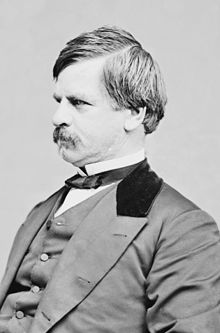Nathaniel Banks
| Nathaniel P. Banks | |
|---|---|

Portrait by Brady-Handy studio, c. 1860–1875
|
|
| 21st Speaker of the U.S. House of Representatives | |
|
In office February 2, 1856 – March 4, 1857 |
|
| President | Franklin Pierce |
| Preceded by | Linn Boyd |
| Succeeded by | James Lawrence Orr |
| Member of the U.S. House of Representatives from Massachusetts's 5th district |
|
|
In office March 4, 1889 – March 3, 1891 |
|
| Preceded by | Edward D. Hayden |
| Succeeded by | Sherman Hoar |
|
In office March 4, 1875 – March 3, 1879 |
|
| Preceded by | Daniel W. Gooch |
| Succeeded by | Selwyn Z. Bowman |
| Member of the U.S. House of Representatives from Massachusetts's 6th district |
|
|
In office December 4, 1865 – March 3, 1873 |
|
| Preceded by | Daniel W. Gooch |
| Succeeded by | Benjamin Butler |
| Member of the U.S. House of Representatives from Massachusetts's 7th district |
|
|
In office March 4, 1853 – December 24, 1857 |
|
| Preceded by | John Z. Goodrich |
| Succeeded by | Daniel W. Gooch |
| 24th Governor of Massachusetts | |
|
In office January 7, 1858 – January 3, 1861 |
|
| Lieutenant | Eliphalet Trask |
| Preceded by | Henry Gardner |
| Succeeded by | John Albion Andrew |
| Personal details | |
| Born |
Nathaniel Prentice Banks January 30, 1816 Waltham, Massachusetts |
| Died | September 1, 1894 (aged 78) Waltham, Massachusetts |
| Political party |
Democratic (before 1855) American (1855–1857) Republican (1857–1875) (1877–1894) Independent (1875–1877) |
| Spouse(s) | Mary Theodosia Palmer |
| Profession | Politician, military officer, U.S. marshal |
| Signature | |
| Military service | |
| Allegiance | United States of America Union |
| Service/branch |
United States Army Union Army |
| Years of service | 1861–1865 |
| Rank |
|
| Commands |
Army of the Shenandoah V Corps Army of the Gulf |
| Battles/wars | American Civil War |
Nathaniel Prentice (or Prentiss)Banks (January 30, 1816 – September 1, 1894) was an American politician from Massachusetts and a Union general during the Civil War.
A millworker by background, Banks was prominent in local debating societies, and his oratorical skills were noted by the Democratic Party. But his abolitionist views fitted him better for the nascent Republican Party, through which he became Speaker of the United States House of Representatives and Governor of Massachusetts in the 1850s. Always a political chameleon (for which he was criticized by contemporaries), Banks was the first professional politician (with no outside business or other interests) to serve as Massachusetts Governor.
At the outbreak of the Civil War, President Lincoln appointed Banks as one of the first 'political' major generals, over the heads of West Point regulars, who initially resented him, but came to acknowledge his influence on the administration of the war. After suffering a series of inglorious setbacks in the Shenandoah River Valley at the hands of Stonewall Jackson, Banks replaced Benjamin Butler at New Orleans as commander of the Department of the Gulf, charged with administration of Louisiana and gaining control of the Mississippi River. But he failed to reinforce Grant at Vicksburg, and badly handled the Siege of Port Hudson, taking its surrender after Vicksburg had fallen. He then launched the Red River Campaign, a failed attempt to occupy eastern Texas that prompted his recall. Banks was regularly criticized for the failures of his campaigns, notably in tactically important tasks including reconnaissance. Banks was also instrumental in early reconstruction efforts in Louisiana, intended by Lincoln as a model for later such activities.
...
Wikipedia
